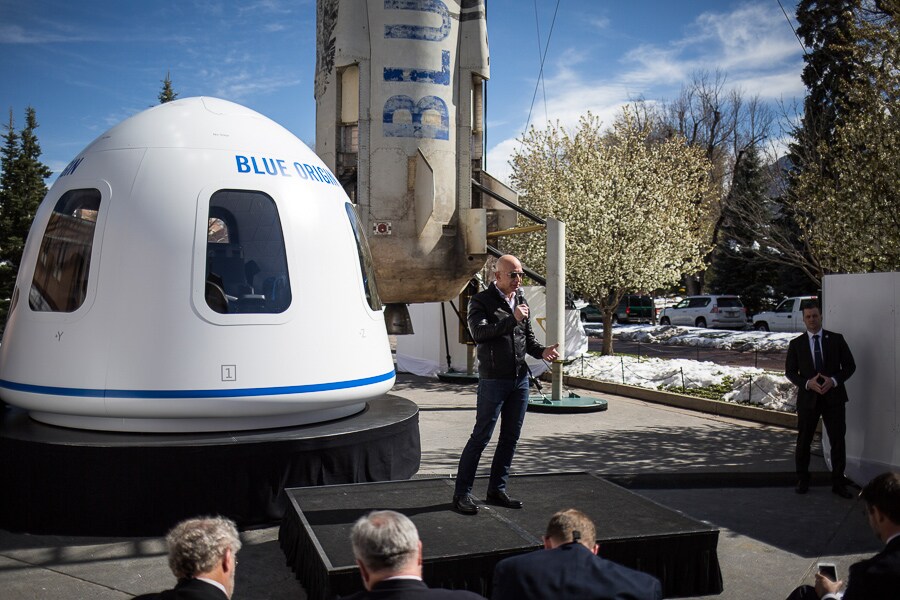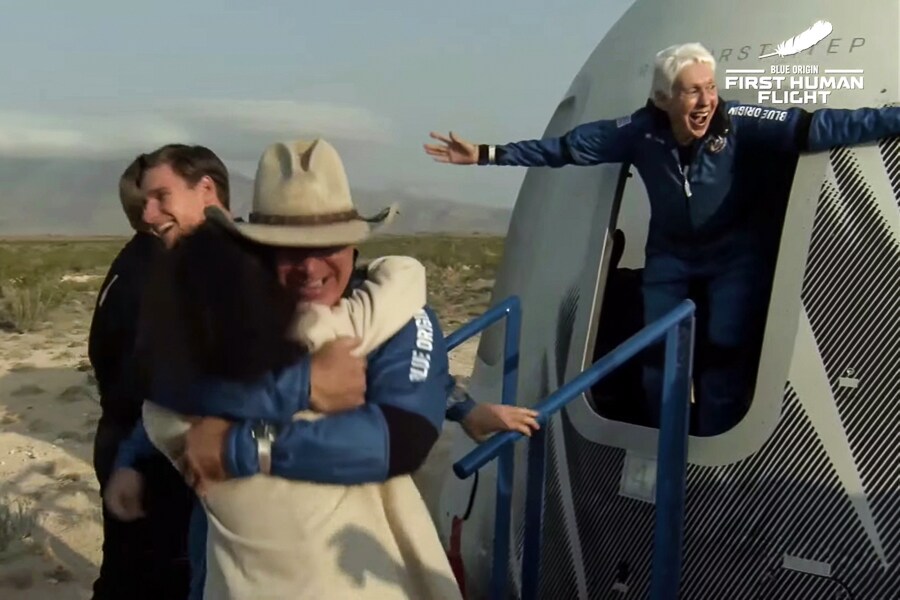While Bezos was beaten to space last week by Richard Branson, the British entrepreneur who flew in a rocket plane from his company Virgin Galactic, some analysts consider Blue Origin, founded by Bezos more than 20 years ago, to be a more significant contender in the future space economy. The company has ambitions of a scale far beyond short flights for space tourists, and it is backed by the entrepreneur who made Amazon into an economic powerhouse.
Lori Garver, who served as deputy administrator of NASA during the Obama administration, said Bezos “has a huge, long-term vision that is multigenerational." She added that his intent for Blue Origin was to “compete for even higher stakes" in the growing business of space.
In 2017, Bezos announced that he would sell $1 billion of Amazon stock a year to fund the space venture, and Blue Origin has already pursued a range of business opportunities, such as trying to win contracts for a moon lander for NASA astronauts as well as launching satellites for the Department of Defense on large reusable rockets.
In recent years before he stepped down as CEO of Amazon, Bezos would typically spend a day a week — usually Wednesdays — focused on Blue Origin. That Bezos was seated in the capsule for Tuesday’s space trip makes plain that he is putting spaceflight at the top of his spending list.
“The only way that I can see to deploy this much financial resource is by converting my Amazon winnings into space travel," he said a few years ago, couching his investment as a form of philanthropy.
Bezos has described a vision of humanity’s future that is influenced by the proposals of Gerard K. O’Neill, a Princeton physicist. In the 1970s, O’Neill proposed giant cylinder-shape space colonies that in great enough numbers would support far more people and industry than are possible on Earth.
![]() A screen capture from Blue Origin’s live video feed shows, from left, Oliver Daemen, Jeff Bezos and Wally Funk disembarking the crew capsule near Van Horn, Texas, on Tuesday July 20, 2021. Bezos, the founder of Amazon, and three others lifted off on Tuesday morning in a spacecraft that was built by his rocket company, Blue Origin Image: Blue Origin via The New York Times
A screen capture from Blue Origin’s live video feed shows, from left, Oliver Daemen, Jeff Bezos and Wally Funk disembarking the crew capsule near Van Horn, Texas, on Tuesday July 20, 2021. Bezos, the founder of Amazon, and three others lifted off on Tuesday morning in a spacecraft that was built by his rocket company, Blue Origin Image: Blue Origin via The New York Times
“The solar system can easily support a trillion humans," Bezos said. “If we had a trillion humans, we would have a thousand Einsteins and a thousand Mozarts and unlimited, for all practical purposes, resources and solar power."
By contrast, Elon Musk, the founder of SpaceX, has focused on the idea of settling Mars. Getting to Mars is an easier task than building one of O’Neill’s colonies, but making cold and airless Mars hospitable to human civilization would be an enormous undertaking.
And despite Tuesday’s successful flight, Blue Origin has much progress to make. To have the effect on humanity’s future that Bezos describes, Blue Origin will need much more than the small New Shepard vehicle that Bezos and three other passengers flew to the edge of space Tuesday.
Although private enterprise has always worked with governments on space travel, it is only in recent decades that private companies have started seeking to make business opportunities from tourist spaceflight.
Blue Origin’s accomplishments pale next to the rocket company led by another of the world’s richest people: SpaceX, which Musk founded a couple of years after Blue Origin started.
SpaceX is already a behemoth in the space business. It regularly takes NASA astronauts and cargo to the International Space Station, it has already deployed more than 1,500 satellites in its Starlink constellation to provide internet service everywhere, and it is developing a gargantuan rocket called Starship for missions for Mars and elsewhere.
By contrast, Blue Origin’s forthcoming projects, at least in the near future, do not seem poised to upend the space industry the way SpaceX has.
The larger reusable rocket for launching satellites that Bezos’ company is working on, New Glenn, is still more than a year away, and efforts to win major government contracts like launching Department of Defense satellites have so far come up empty. A lunar lander that Blue Origin hopes NASA will someday use to carry astronauts was not selected, at least for the moment, because NASA said it had money for only one design — SpaceX’s.
Blue Origin’s mascot is the tortoise. As in the fable “The Tortoise and the Hare," perhaps with steady, constant effort, Blue Origin can catch up.
Garver recalled Bezos going to Washington to meet with her and NASA Administrator Charles Bolden. At the time, Blue Origin was an enigma.
“We were thrilled to hear of his plan," she said. “It was: ‘I’m here because I’m investing in a space company. I am prepared to invest a lot over the long term. And my goals are very aligned with NASA. So if I can be of help in any way, let’s work together.’"
Blue Origin was working on a capsule that could carry astronauts to the International Space Station, and it won a modest $25.6 million development contract from NASA. But work on that vehicle stalled, and Blue Origin dropped out of the competition for the contracts that ultimately went to Boeing and SpaceX.
“Slow and steady was slower than anybody hoped," Garver said.
But the comparisons to SpaceX’s extraordinary successes are somewhat unfair, she said.
“We are really spoiled by SpaceX right now," Garver said.
Even if Blue Origin has not yet lived up to its lofty vision, more companies will mean more competition. “I’m not really as disappointed as some people at their pace," Garver said. “I feel they’ll get there. We need competition."
Laura Seward Forczyk, founder of the aerospace consulting firm Astralytical, was also positive. “Although their progress has been slow, they haven’t had any large failures that indicate to me that they’re at risk," she said. “Blue Origin is still finding its way forward."
While Blue Origin awaits the path that Bezos will lead it down, Tuesday’s flight was a milestone, the first flight from the company to carry people to space, even though it did not enter orbit.
At 8:11 a.m. Central time, the stubby rocket and capsule, named New Shepard after Alan Shepard, the first American in space, rose from the company’s launch site in Van Horn, a thin jet of fire and exhaust streaming from the rocket’s engine.
Over the past six years, Blue Origin has conducted 15 successful test flights without people aboard, and engineers deemed that New Shepard, which flies with no pilot, was finally ready for passengers — their boss included.
The other three passengers were Bezos’ brother, Mark Oliver Daemen, a Dutch student who was Blue Origin’s first paying passenger and Mary Wallace Funk, a pilot who in the 1960s was among a group of women who passed the same rigorous astronaut selection criteria employed by NASA but who, until Tuesday, never had the chance to board a rocket.
At 18, Daemen was the youngest person ever to go to space. At 82, Funk, who goes by Wally, was the oldest.
“I want to thank you, sweetheart," Funk said to Jeff Bezos during a news conference. “I’ve been waiting a long time."
Once the booster had used up its propellant, the capsule detached from the rocket at an altitude of about 47 miles. Both pieces continued to coast upward to 66.5 miles, passing the 62-mile boundary often considered to be the beginning of outer space.
The passengers unbuckled and floated around the capsule, somersaulting and tossing Ping-Pong balls and Skittles candy as they experienced about four minutes of free fall.
The booster landed vertically near the launch site, similar to SpaceX’s rival reusable Falcon 9 rocket. The capsule then descended under parachutes until it gently set down in a puff of dust.
Ten minutes and 10 seconds after launch, it was over. A few minutes later, the four emerged euphorically from the capsule, greeted with hugs from friends and family.
Two more passenger-carrying flights are scheduled for this year with the company hoping to speed the pace of operations next year. Blue Origin has declined to say how much the early customers are paying or how many have signed up. However, Bezos said: “We’re approaching $100 million in private sales already. And the demand is very, very high."
In addition to the high cost of tickets to ride on New Shepard, Bezos also called attention to the vast wealth at his disposal when he remarked on how it was possible for him to finance Blue Origin in the first place.
“I also want to thank every Amazon employee and every Amazon customer," Bezos said in a news conference after the flight, “because you guys paid for all of this."
That remark prompted a number of scornful responses from critics. Perhaps to blunt attacks from those who say he is just using his wealth create diversions for the wealthy, Bezos announced that he had created a prize for individuals he said exemplified acts of both civility and courage.
The award offered $100 million each to two people — Van Jones, a CNN political commentator, and José Andrés, chef and restaurateur — to be donated to charitable causes of each recipient’s choosing.
Whatever Blue Origin’s future will be, Bezos remained pleased Tuesday. Would he make another trip?
“Hell yes," he said. “How fast can you refuel that thing? Let’s go."

 Jeff Bezos in front of Blue Origin"s New Shepard system during the Space Symposium in Colorado Springs, Colo., April 5, 2017. On Tuesday, Jeff Bezos, the richest human being in the universe, who will strap into a capsule built by his rocket company, Blue Origin, and blast off to more than 62 miles above West Texas Image: Nick Cote/The New York Times[br]
Jeff Bezos in front of Blue Origin"s New Shepard system during the Space Symposium in Colorado Springs, Colo., April 5, 2017. On Tuesday, Jeff Bezos, the richest human being in the universe, who will strap into a capsule built by his rocket company, Blue Origin, and blast off to more than 62 miles above West Texas Image: Nick Cote/The New York Times[br] A screen capture from Blue Origin’s live video feed shows, from left, Oliver Daemen, Jeff Bezos and Wally Funk disembarking the crew capsule near Van Horn, Texas, on Tuesday July 20, 2021. Bezos, the founder of Amazon, and three others lifted off on Tuesday morning in a spacecraft that was built by his rocket company, Blue Origin Image: Blue Origin via The New York Times
A screen capture from Blue Origin’s live video feed shows, from left, Oliver Daemen, Jeff Bezos and Wally Funk disembarking the crew capsule near Van Horn, Texas, on Tuesday July 20, 2021. Bezos, the founder of Amazon, and three others lifted off on Tuesday morning in a spacecraft that was built by his rocket company, Blue Origin Image: Blue Origin via The New York Times